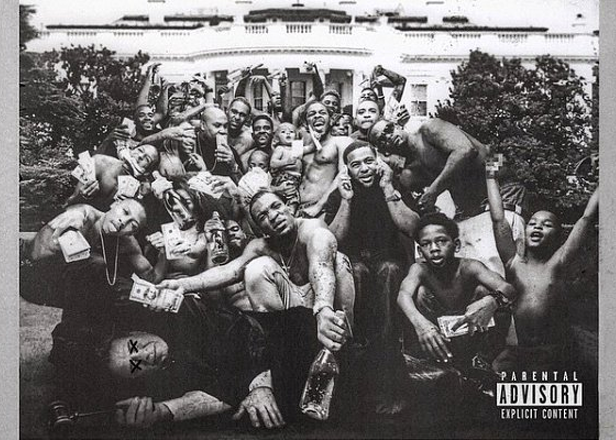When
it comes to Kendrick Lamar, I’m a pathetic fanboy who froths at the mouth at
every guest verse, every live performance, every interview. He can do no wrong,
can Hip Hop’s saviour. So, these first impressions may not exactly bear the visage
of objectivity. How does it hold up compared to Good Kid M.A.A.D. City, my favourite album of the decade so far? Here’s
what I think after my first listen.
It’s
as intense as Good Kid, though not in
the way you’d expect. Firstly, it’s not
as immediately personable as his sophomore record. His perspective is broader
and looser, a kaleidoscopic indictment, where it’s sardonic wit rather than idiosyncratic
narratives which hit hard. The funkadelic ‘King Kunta’ is powered by an
insatiable beat and a fervently energetic flow recalling early 00s Eminem. He
patronises the shit out of the politically lethargic on the aptly distressing ‘Hood
Politics,’ corroborated by sinisterly tangled instrumentation. The four-minute
bout of irreverence that is ‘You Ain’t Gotta Lie’ ridicules the idea of indiscriminate
political, economic and legal systems. Kendrick includes himself as one of the egocentric
on the self-abasing ‘How Much a Dollar Cost’. The gargantuan ‘Mortal Man’
directly confronts the listener, ‘when the shit hits the fan, is you still a
fan?’ This is not a question from Kendrick alone, but his namechecked
Martin Luther King Jr, Nelson Mandela, and even Moses. Kendrick doesn’t elevate
himself to their stature, but asks the legitimate question of whether activism
for change, political or otherwise, is realistic in a visibly apathetic and
self-absorbed society. ‘Mortal Man’ concludes with a conversation with someone
unexpected where he finally reveals the significance of the Butterfly image. I won’t spoil it, but
fuck me it’s powerful. The respite of the self-celebratory ‘i’, the penultimate
track, is certainly vindicated.
George
Clinton introduces To Pimp, and you’d
struggle to employ someone more proper. Not only is his presence symptomatic of
the 70s-esque political radicalism and upheaval affirmed by the album, the influence
of Funk and Soul legends is apparent in the production. An unsettling
dissonance saturates the more explicitly political tracks, freeform jazz
clarinets and trumpets confound rigid beats and a tight multiplicity of resigned,
disaffected voices of which Kendrick is only the arbitrator. Mellifluously
chilled synths establish a pensive solemnity not divergent from What’s Going On? or Doggystyle, where expressions of anguish in the foreground are hazy
and immaterial by association. Dissonance monopolises everything; there’s
clinkety piano, unflustered percussion, and ethereal samplings. It’s tough to
categorise it even as Hip Hop, such is the extent of its Soul metamorphosis. Kendrick
isn’t Killer Mike or Chuck D, rather than venomously spitting cold-cut fury he
dispassionately describes his understanding of the metropolis, and it’s
horrifying.
To Pimp a Butterfly
could be a
synthesis of Marvin Gaye, James Brown, Snoop Dogg, and even Eminem, but it is
still manifestly Kendrick. The vulnerable sobbing in the second half of ‘u’; the
‘Smooth Criminal’ paraphrasing flourish on ‘King Kunta’; the glimpses of comic
relief exemplified in the achingly rhetorical question ‘what if these walls could talk???’ on ‘These
Walls’ being bluntly answered ‘sex,’ a gloriously basic subversion of government
paranoia. This consequently turns into an enchantingly seductive conflation of anti-totalitarian
politics, a sigh of the ambiguity of the modern identity, and sexual
neuroticism. One of the best songs on the album.
It
doesn’t always work. ‘For Sale?’ is an operational continuation about the consumerist
gentrification of identity, but it isn’t particularly original or interesting,
thematically or musically. ‘i’ is great, but feels displaced from its appropriate
place on the album, disharmoniously transplanted within the heartrending final
triumvirate, and not in a good way. I feel shifting it between ‘How Much’ and ‘Complexion’
would remove the dichotomy while still retaining relevance.
Between
tracks Kendrick’s voice stands in omniscient solitude, communicating to – I’m
not sure who. America’s white patriarchal plutocracy? The African American
community? Each and every listener regardless of creed or colour? It’s unclear,
and this is why it’s effective. We’re all culpable in an oppressive state,
whether we subjugate, or habitually submit to subjugation. Kendrick repeats
with cold detachment; ‘I remember you was conflicted/misusing your
influence/sometimes I did the same/abusing my power full of resentment’. It’s
all rather intangible; at least, until near the end. His attacks on the state
are frequent, but his colossal, best-song-on-the-album second single ‘The
Blacker The Berry’ inverts this in the cleverest of manners. How can you castigate
a government for violence and prejudice when the public perpetuates a transparently
violent and prejudiced society? ‘Hypocrite’? We’re all fucking hypocrites. As
MC Eiht purported on ‘M.A.A.D. City’, it’s time to wake our punk asses up.
Poignantly, ‘Mortal Man’ ends on a more hopeful note. Kendrick, enabled by his conversation,
escapes his solipsistic introspection and realises that everything that has
happened to him has been for a reason; that he as a public figure holds a
responsibility to inspire change towards a more peaceful and egalitarian
America. He must act quickly, after all he, like his friend in conversation, is
only mortal.
To Pimp a Butterfly is very, very different from Good Kid, but only time will tell if it’s
just as good. The first listen inspires optimism.
